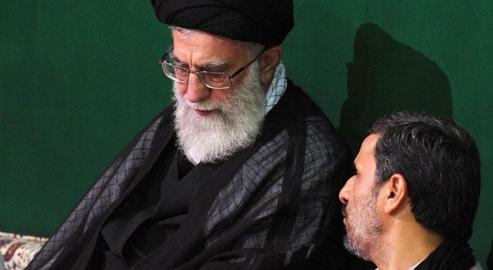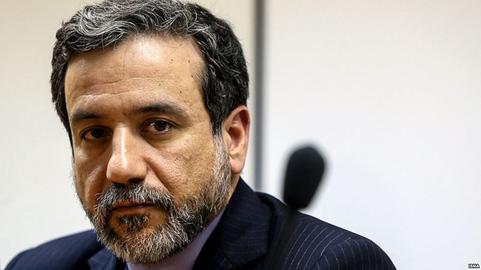This is the first article in IranWire’s series Decoding Iranian Politics. The series will examine the building rift between Iran’s various political factions, go behind the scenes of the country’s fiercest political scandals and assess what impact the complex web of government institutions has on Iranian politics today, as well as take stock of some of the most defining moments in recent history.
What you Need to Know about Ahmadinejad’s Conflict with the Supreme Leader
The rift between former president Mahmoud Ahmadinejad and Iran’s Supreme Leader Ayatollah Khamenei continues to deepen, particularly since the arrests of his closest confidants, Esfandiar Rahim Mashaei and Hamid Baghaei in March 2018. In a series of unprecedented moves, Ahmadinejad has written three open letters to Khamenei since February 2018, setting out his criticisms of both the regime’s policies and the Leader’s appointees.
So what Happened with Mashaei?
Esfandiar Rahim Mashaei, who many view to be the politician with the greatest influence on Ahmadinejad, was summoned to the Revolutionary Court on charges of “insulting the Leader and propaganda against the regime” and arrested on March 17, 2018.
During Ahmadinejad’s presidency, a lot of the president’s conservative allies, including many high-ranking clerics, harshly criticized Mashaei, labeling him the head of a “deviant current” — a reference to those Ahmadinejad associates who were accused of straying from the Supreme Leader’s ideas. Many of Mashaei’s opponents believed he was the main reason for Ahmadinejad’s “disobedient” behavior toward the Leader during his second presidential term — which included sulking at home for 11 days and refusing to work after Khamenei overruled the president’s decision to dismiss his minister of intelligence, Haydar Moslehi, in April 2011.
Nevertheless, the then president refused to end his close working relationship with Esfandiar Rahim Mashaei. Instead, in July 2009, Ahmadinejad appointed Mashaei to be his first vice president, prompting the Leader to write to the president and appeal to him to reverse this decision. Ahmadinejad resisted Khamenei’s order for about a week. When Mashaei finally resigned from his new position in order to ease the tension, the president immediately appointed him as his chief of staff.
Despite the increasing pressure on Mashaei by the Leader’s appointees, Mahmoud Ahmadinejad supported his ally’s candidacy for the 2013 presidential election — but the Guardian Council put an end to this and disqualified Mashaei from running.
And What Happened with Baghaei?
Hamid Baghaei, Ahmadinejad’s vice president for executive affairs from 2011 to 2013, has also been in prison since March 13, 2018. He has been sentenced to 15 years in jail and about 8.5 million dollars in fines on financial charges.
One of the charges against him is the embezzlement of US$590,000 and 3.5 million euros. The Revolutionary Guards (IRGC) says the Qods Force (the IRGC’s branch responsible for extraterritorial operations) handed these amounts to Baghaei in cash, in 2012 and 2013, so that he could deliver it personally to what was described as “some African states.” The IRGC accuses Baghaei of not having transferred the funds to the intended recipients. But Baghaei denies the charges, insisting that such Qods Army-related transactions were handled at higher levels, by President Mahmoud Ahmadinejad and Ghasem Soleimani, the commander of the Qods Force. Ahmadinejad has confirmed Baghaei’s version of events, and has demanded that General Soleimani testify in court to support Baghaei. Ahmadinejad has also warned that he is ready to elaborate on his “working relations” with General Soleimani, a statement which some have viewed to be an indirect threat to disclose state secrets about Qods Force activities.
Prior to his recent imprisonment, Hamid Baghaei had served two other jail sentences: He spent seven months in prison between June 2015 and January 2016, and then 16 days in July 2017, both times on financial charges.
In 2017, Hamid Baghaei and Mahmoud Ahmadinejad both announced they would be running as candidates in that year’s presidential election — six months after Ayatollah Khamenei’s original advice to Ahmadinejad, in September 2016, that he not put himself forward as a candidate. The Guardian Council rejected both of them as candidates.
How has Ahmadinejad Reacted to the Imprisonment of his Confidants?
Mahmoud Ahmadinejad has reacted strongly to the arrest of his closest confidants. Since February 2018, he has published three open letters to Ayatollah Khamenei, criticizing the state’s policies and the judicial system using terminology similar to that of the opposition. In his letters, he has criticized the illegal treatment of detainees in Iran’s prisons, lack of freedom of expression, the interference of military forces in the economy and elections, and the Guardian Council’s manipulation of the elections. He has also asked the Leader to remove the head of Iran’s judiciary, and to make “fundamental reforms in the three branches of the government, state institutions and especially the Leader’s Office,” as well as ordering that “urgent and free parliamentary and presidential elections” be held.
By making such stands, Mahmoud Ahmadinejad is apparently seeking the support of the critics of the Islamic Republic of Iran. But it seems that very few opponents of the regime believe that Ahmadinejad is sincere in his new approach, especially given the country’s human rights record during his presidential era, and the violent suppression of the protests that followed the 2009 presidential election — a response that did not receive any criticism from Ahmadinejad.
It appears, however, that a group of the regime’s opponents do have an interest in the possible outcome of Ahmadinejad’s attempts to weaken the Leader’s authority. In addition, a group of pro-regime activists also support Ahmadinejad, as they believe he is confronting corrupt officials responsible for the country’s problems and endangering the Islamic Republic of Iran. The latter group usually – though not always – refrains from criticizing the Leader directly, but does not hesitate to criticize other state officials. Dozens of such activists have been arrested so far, many of them having been previously affiliated with hardline institutions (some of them have even reportedly fought as volunteers in Syria).
What Leverage Does Ahmadinejad have?
In spite of all these clashes, Mahmoud Ahmadinejad has not yet been able to mobilize a significant social force behind him. For example, since the beginning of April 2018, he and his allies have held two sit-in protests in a holy shrine near Tehran, Emam-zade Saleh, in support of Ahmadinejad’s imprisoned confidants, but fewer than 100 people participated in each event. Nevertheless, one can assume that if the country’s security apparatus did not apply pressure on Ahmadinejad’s supporters, many more people would accompany him in such events.
Mahmoud Ahmadinejad and his associates have always warned their opponents that the former president has knowledge of the wrongdoings of various Iran’s state officials — incriminating untold stories that he might reveal in future. Using these warnings as a basis, many people on social media seem to be convinced that Ahmadinejad may use such information to prevent state institutions from taking tougher actions against him. But, so far, Ahmadinejad’s disclosures about officials have been far less important than the expectations he has raised among the public. This suggests that most of Ahmadinejad’s implicit threats to reveal overwhelming information may have been bluffs. However, this does not necessarily mean that Iran’s ex-president will not expose more information in future.
All this being said, a big question has been raised by both media outlets and on social media: Will Ayatollah Khamenei personally authorize tougher measures against Mahmoud Ahmadinejad, either via the judiciary or the security forces? And if so, when?
Given the very high price that the Leader paid to support Ahmadinejad during his presidency, and especially in the aftermath of the controversial 2009 presidential election, it is understandable that Khamenei prefers to contain his previously beloved president rather than to put him in jail or under house arrest.
Nevertheless, if Ahmadinejad continues to cross Ayatollah Khamenei’s red lines, there is no guarantee that he will be protected in future.
visit the accountability section
In this section of Iran Wire, you can contact the officials and launch your campaign for various problems


























comments